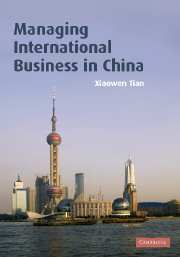Book contents
- Frontmatter
- Contents
- List of figures
- List of tables
- List of boxes
- Preface
- 1 Introduction
- 2 Look before you leap
- 3 Manage guanxi strategically
- 4 Select an entry mode
- 5 Form an alliance
- 6 Negotiating with Chinese partners
- 7 Production operations management
- 8 Marketing management
- 9 Human resource management
- 10 The protection of intellectual property rights
- 11 Corporate finance considerations
- References
- Index
- References
4 - Select an entry mode
Published online by Cambridge University Press: 05 June 2012
- Frontmatter
- Contents
- List of figures
- List of tables
- List of boxes
- Preface
- 1 Introduction
- 2 Look before you leap
- 3 Manage guanxi strategically
- 4 Select an entry mode
- 5 Form an alliance
- 6 Negotiating with Chinese partners
- 7 Production operations management
- 8 Marketing management
- 9 Human resource management
- 10 The protection of intellectual property rights
- 11 Corporate finance considerations
- References
- Index
- References
Summary
A mode of entry is an institutional arrangement chosen by the firm to operate in the foreign market. This decision is one of the most critical strategic decisions for the firm. It affects all the future decisions and operations of the firm in that country market. Since each mode of entry entails a concomitant level of resource commitment, it is difficult to change from one entry mode to another without considerable loss of time and money (V. Kumar and Velavan Subramanian (1997, p. 53)).
When a transnational corporation plans to move into a new overseas market it has to, first of all, think about how to enter this market. There are many ways or modes by which a TNC can enter a new market, such as exporting, franchising, licensing, joint ventures and wholly owned subsidiaries. Selecting an entry mode is one of the most important strategic decisions that a TNC has to make when it enters the Chinese market, so important that it may determine its success or failure in China. In this chapter we first review the literature on entry mode selection in international business studies, and propose an approach to the classification of market entry modes. Subsequently, in section 2, we illustrate the market entry modes available to TNCs in China, and highlight major changes in the entry modes that have been adopted.
- Type
- Chapter
- Information
- Managing International Business in China , pp. 72 - 93Publisher: Cambridge University PressPrint publication year: 2007



